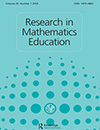
Polotskaia, E., & Savard, A. (2018). Using the Relational Paradigm: effects on pupils’ reasoning in solving additive word problems.Research in Mathematics Education, 20(1). https://doi.org/10.1080/
Abstract: Pupils’ difficulties in solving word problems continue to attract the attention of researchers. While researchers highlight the importance of relational reasoning and modelling, school curricula typically use short word problems to develop pupils’ knowledge of arithmetic operations and calculation strategies. The Relational Paradigm attributes the leading role in mathematics learning to the relational thinking development. Using this perspective, we implemented a new approach to teaching additive word problem solving in primary school, encouraging relational thinking and modelling. We compared the overall results of additive word problems solved by Grade Two elementary pupils in the experimental group (N=216) and in the control group (N=196). Our data shows: a) on average, the experimental group performed significantly better in problem solving than the control group; b) in the control group, there was a considerable lack of success in solving problems that require relational thinking—there was no such effect in the experimental group.
Draft of the article
